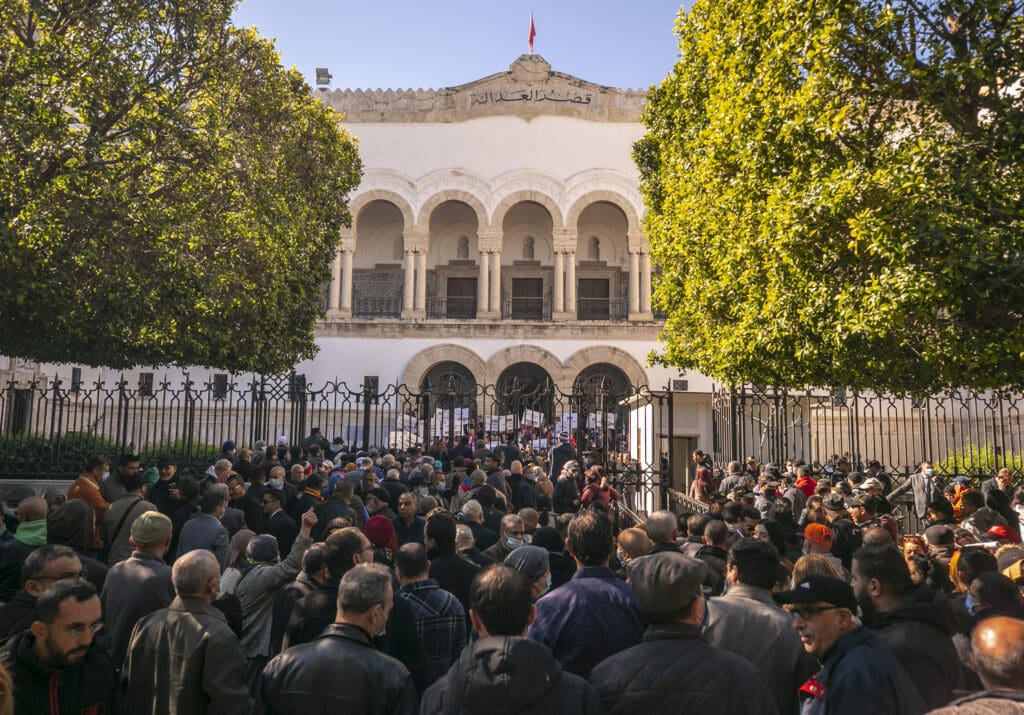On August 5, a Tunisian court sentenced four potential presidential candidates on charges of buying endorsements and banned them from running in the upcoming elections slated for October 6. Among the four were the prominent politician and former Ennahda leader Abdellatif Mekki and the activist and TV host Nizar Chaari. In addition, the key opposition figure Abir Moussi, who has been in jail since October 2023 but was also a candidate for president, was sentenced to an additional two years imprisonment for criticizing the country’s election authority. Other politicians who have announced their intentions to run for the top job have been arrested over the past months on varying allegations of corruption. For critics, this represents a coordinated campaign to prevent any serious competition to incumbent President Kais Said, who happened to submit his own official candidacy on the same day four of his competitors were banned from the race.
A few days later, Tunisia’s Independent High Authority for Elections announced its list of primary accepted candidates. Among 17 applications, only three met the legal and formal requirements, according to the election authority, including the president himself. The other two include Ayachi Zammel, a businessman and leader of the Azimoun Movement party, and Zouhair Maghzaoui, head of the People’s Movement party.
While several of the rejected candidates reported that the ministry of interior refused to provide them with their criminal records—one of the requirements for contesting the office along with securing the right number of electoral endorsements—the election authority stated that all rejection decisions were due to unmet endorsement requirements or, in the case of one rejected candidate, not meeting the nationality requirement.
Politicizing Anti-Corruption
Ironically, Saied has been campaigning on an anti-corruption agenda since his presidential run in 2019, in which he condemned the corrupt elite for the country’s economic demise and vowed to wage war against corruption until it was “eviscerated.” Yet with his first term nearing its end, tangible progress in eradicating corruption is difficult to see. Indeed, corruption remains rampant, and state-led anti-corruption efforts seem like they are being exploited for political propaganda and a pretext for cracking down on dissent.
Since 2021, the country’s ranking on Transparency International’s Corruption Perception Index has been regressing. By 2023, Tunisia ranked 87 out of 180 countries, down from 70 two years earlier. Public perceptions of corruption have also been soaring, with 90% of Tunisian respondents believing corruption is pervasive in public institutions, as per recent polling data by the Arab Barometer.
This is unsurprising. Anti-corruption efforts have been halting at best. In fact, Saied’s 2021 decision to suspend parliament for nearly 20 months stalled the implementation of anti-corruption legislation and marked a major setback in the pursuit of accountability. His dissolution of the Supreme Judicial Council in 2022, coupled with a crackdown on the wider judiciary for allegations of corruption and obstruction of justice, further undermined anti-corruption efforts by eroding trust in the integrity of the judicial institution and its effectiveness. Lastly, his suspension of the top anti-corruption agency, the Instance Nationale de Lutte Contre la Corruption (INLUCC), subsequently paralyzed such efforts by obstructing ongoing investigations and denying whistleblowers protection, thus deterring public willingness to report corruption.
Moreover, while Saied anchored his anti-corruption campaign on criminal reconciliation, asset forfeiture efforts have yet to bear fruit. Vowing to recover approximately 13.5 billion Tunisian Dinars (about $4.3 billion) worth of looted assets and illicit funds from corrupt businessmen—to be re-invested in developmental projects—in exchange for immunity, reconciliation proceeds barely exceeded 26 million Dinars (about $8.5 million).
Instead, anti-corruption efforts seem to have devolved into a series of targeted arrests and selective prosecutions aimed mostly at cracking down on political opponents. The country has experienced a wave of arrests targeting several public figures including political opposition, judges, journalists, and businessmen, among others. Detentions have surged in the lead-up to the presidential elections. Recently, opposition leader Lotfi Mraihi was detained for money laundering allegations, sentenced to eight months, and banned for life from running for president for vote-buying endorsements.
Is the Witch Hunt Necessary?
According to the latest polling by the Arab Barometer, Saeid is still very popular, raising the question of whether these political arrests are even necessary to guarantee his re-election. Although there has been a slight decrease since the end of 2021, 77% of respondents at the end of 2023 reported that they trusted Saied “a great deal or quite a lot.” Trust levels in Saied-the-president remain the highest among the different political actors, with a striking majority of 91% reporting their support for Saied’s 2021 parliament suspension, viewed by critics as the first step in his power-grab.
While effort and resources are being dedicated towards political arrests and the anticorruption agenda, urgent socio-economic problems remain unaddressed. This may, in fact, be the point: the president could be initiating an anti-corruption witch hunt to distract from the failure to turn around the economy, which continues to struggle with stagnant growth, high unemployment and rising inflation rates. Tunisians identified the economic situation as the country’s biggest challenge and their ratings of economic performance are lower than they were when Saied first took office. Confronted with rising prices and absent economic opportunities, more than quarter of Tunisians suffer from hunger and severe food insecurity.
The current government has not only been unsuccessful in tackling the impeding socio-economic hurdles but has been unable to reverse the public deficit. The annual fiscal deficit has reached a peak in 2020 and public debt has continuously increased, plateauing at nearly 80% of the GDP for the past four years of Saeid’s term. The accumulated arrears and the mounting burden of public debt have pushed the authorities to accept a $1.9 billion bailout loan from the International Monetary Fund (IMF) in return for stringent spending cuts and reforms. However, Saied vetoed the process and rejected the deal as these “foreign diktats”—mainly eliminating all subsidies—would exacerbate poverty and inequality—a point several experts agree with.
The dire socio-economic situation continues to push more Tunisians towards the sea—with some attempting to reach Europe via dangerous and illegal migration boats. About 46% of the Arab Barometer respondents—men and women equally—expressed a desire to leave the country in way or another, more than double the 2011 levels.
Two Stories
While polling data continues to show staunch support for Saied’s anti-corruption agenda, and even the integrity of such efforts, the desire of most Tunisians to leave the country tells a different story. Although many might believe that corruption is at the heart of the economic problems, many seem not to have faith that Saied can do much about it, beyond the sideshow of arresting his opponents. The tragedy is they may be willing to sacrifice their nascent democracy in order to let him try.



